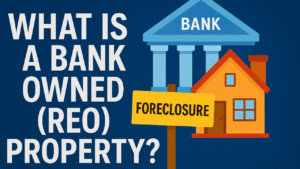 What Is a Bank Owned (REO) Property — And Should You Consider Buying One?
What Is a Bank Owned (REO) Property — And Should You Consider Buying One?
If you’ve been browsing home listings and come across the term “Bank Owned” or “REO,” you might be wondering what exactly that means—and whether it’s a good opportunity.
Let’s break it down in simple terms.
What Does “Bank Owned” or “REO” Mean?
REO stands for Real Estate Owned, and it refers to a property that a bank or lender now owns after the home has gone through foreclosure.
Here’s how it happens:
- A homeowner stops paying their mortgage.
- The lender forecloses on the home and tries to sell it at a public auction.
- If no one buys the home at auction, it doesn’t go back to the original owner—it becomes the property of the bank.
Once that happens, the home is called a Bank Owned or REO property, and the bank will usually list it for sale to recover its losses.
Why Are REO Homes Often Cheaper?
REO properties are often priced below market value for a simple reason: the bank wants to sell them quickly. These homes are sitting on the bank’s books, not making money, so the goal is to move them fast.
But keep in mind: “cheap” doesn’t always mean a good deal. Many REO homes are sold as-is, which means you might have to budget for repairs or updates.
Pros of Buying a Bank Owned Home
- ✅ Potential for a lower price than similar homes in the same area
- ✅ Clear title — banks usually clear out back taxes and liens before the sale
- ✅ Great option for investors or handy buyers who can fix things up
Cons to Watch Out For
- ⚠️ Homes may be in rough shape — previous owners might have left it in poor condition
- ⚠️ Limited info about the property’s history
- ⚠️ Slow response time from banks when negotiating or approving offers
Thinking About Buying One? Here’s How It Works
- Search for REO listings – Check bank websites, local real estate sites, or talk to an agent who specializes in foreclosures.
- Get pre-approved for a mortgage – Banks want to see you’re serious.
- Make an offer – Your agent will submit it to the bank for review.
- Do a home inspection – Even though it’s “as-is,” it’s important to know what you’re buying.
- Close the deal – The process might take a bit longer than a regular sale, but once approved, you’re good to go.
Bottom Line
Buying a Bank Owned (REO) home can be a smart move—if you do your homework. For budget-conscious buyers or real estate investors, these homes can offer real value. Just be prepared for a little extra work and patience along the way.
If you’re willing to look past a little wear and tear, an REO property might just be the opportunity you’ve been waiting for.